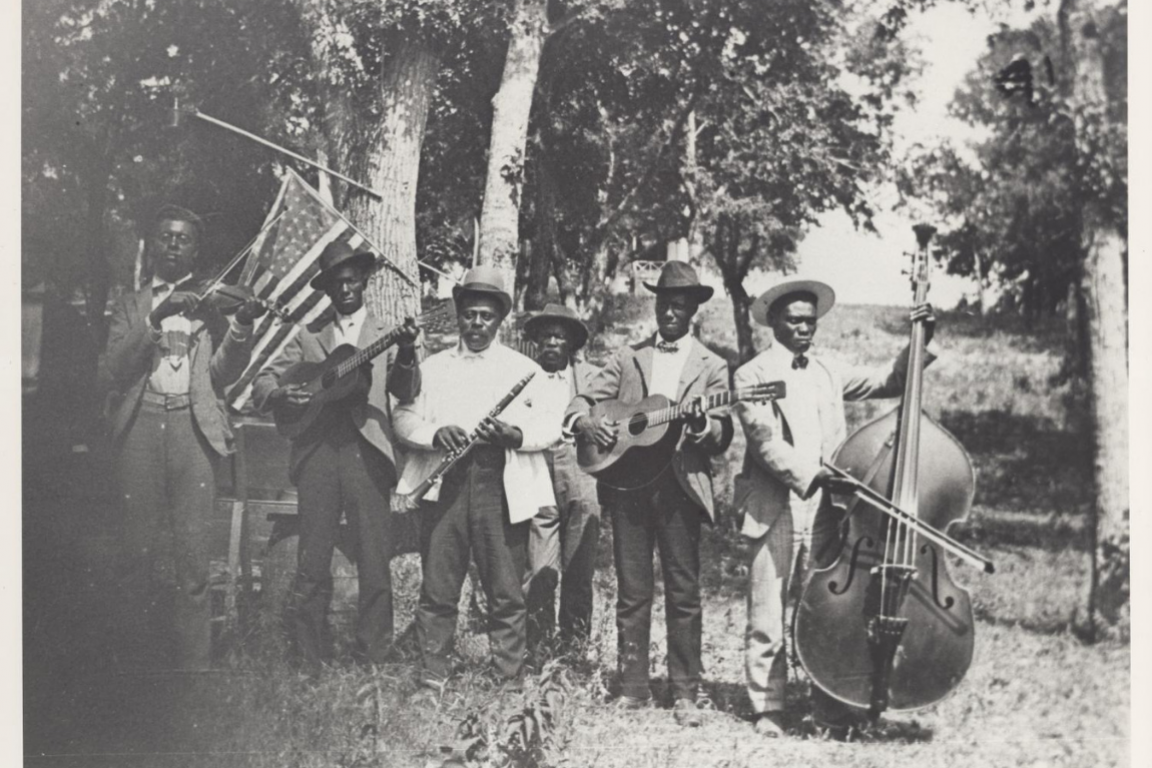 Juneteenth celebration in 1900 at Eastwoods Park. (Image courtesy of Austin History Center)June 19 commemorates the day in 1865 that Union Army Major General Gordon Granger issued General Order #3 informing the people of Texas that "all slaves are free." Freedom, Granger declared, meant "absolute equality of personal rights and rights of property between former masters and slaves." Confederates in Mississippi and Texas were the last hold-outs; they continued to fight long after Robert E. Lee's surrender at Appomattox on April 9. Word of emancipation spread only as fast as Union armies could occupy and liberate the Southern states. Texas, the far western edge of the Confederacy, was last. Since then, June 19 has been remembered by the shorthand given to it by newly freed slaves: Juneteenth.
Juneteenth celebration in 1900 at Eastwoods Park. (Image courtesy of Austin History Center)June 19 commemorates the day in 1865 that Union Army Major General Gordon Granger issued General Order #3 informing the people of Texas that "all slaves are free." Freedom, Granger declared, meant "absolute equality of personal rights and rights of property between former masters and slaves." Confederates in Mississippi and Texas were the last hold-outs; they continued to fight long after Robert E. Lee's surrender at Appomattox on April 9. Word of emancipation spread only as fast as Union armies could occupy and liberate the Southern states. Texas, the far western edge of the Confederacy, was last. Since then, June 19 has been remembered by the shorthand given to it by newly freed slaves: Juneteenth.
 Lori Pierce, associate professor in the Department of African and Black Diaspora Studies.
Lori Pierce, associate professor in the Department of African and Black Diaspora Studies.
Historically, Emancipation was commemorated on several days: Frederick Douglass favored Jan. 1, the day in 1863 when the Emancipation Proclamation took effect. Other days were also suitable for celebration such as Dec. 6, the day the 13th amendment was ratified. But only Juneteenth has endured. Freedmen and women began to celebrate the holiday in 1866, most often with church services of thanksgiving. By the early 20th century, the holiday took on greater significance and was an opportunity for African Americans to remember a past that was uniquely their own.
From the end of the Civil War to WWII, Juneteenth was celebrated almost exclusively by Black communities in Texas. Initially they gathered near lakes, rivers, and other bucolic spots, but White resistance drove them away. Faced with the segregation of public spaces, African American communities from around the state raised enough money to buy property that could be used to celebrate the holiday. They purchased land in Houston and named it Emancipation Park. The holiday was celebrated with picnics, rodeos and church services. It was also used as an opportunity to dress up and show off at public gatherings. Outside of Texas, however, most African Americans were not aware of Juneteenth, so the celebration was seen as something uniquely Texan.
Black Texans began to leave the South with other African Americans during the Great Migration. They fled the racial terrorism that was endemic to the region and were drawn to industrial jobs in the North and West. Many Texans who moved to California brought Juneteenth with them to Oakland, Los Angeles and San Francisco. Wesley Johnson, a Texas migrant and owner of a club called, fittingly, "The Texas Playhouse," began hosting celebrations of the holiday as early as 1950. (San Francisco's celebration is acknowledged as the oldest continuously celebrated Juneteenth outside of Texas.) In 1968, knowledge of the holiday spread organically when it marked the end of the Poor People's Campaign, a series of marches and demonstrations that culminated in the building of "Resurrection City," an encampment of protestors on the National Mall. Activists from all over the country were introduced to the holiday there and took the idea of the annual celebration back home.
Since then, Juneteenth has spread across the country and garnered greater public attention. All but three states (South Dakota, North Dakota, and Hawai‘i) commemorate or recognize the holiday. Each celebration is unique to the location: rodeos are still held in Texas; San Francisco features a classic car show. Some communities take advantage of the day to explore the history of slavery related to their location and celebrate the achievements and contributions made by African Americans before and after Emancipation. Parades, street fairs, food vendors, music, family reunions, job and health fairs, all feature prominently in Juneteenth celebrations.
Juneteenth has been recognized by the state of Illinois since 2003. This year in Chicago and in many other communities, Juneteenth will be linked with the protests and activism sparked by the murder of George Floyd on May 25. Other local organizations are using the holiday to solicit donations to help support Black owned businesses struggling to survive in the wake of Covid-19.
This year, Juneteenth has coincided with the Covid-19 pandemic that has disproportionately affected Chicago's Black community. It also takes place in the wake of on-going Black Lives Matter protests against police violence against African Americans. These events are bound to change the nature of the holiday. Both call attention to the ways that the violent suppression of Black people has persisted since Emancipation. This year's Juneteenth festivities are as much a celebration of historic calls for justice as they are radical acts of hope for the as yet un- realized promises of freedom. Until the "absolute equality" called for in General Order #3 is realized, Juneteenth will remain a celebration of resistance.
Lori Pierce is an associate professor in the Department of African and Black Diaspora Studies. Her areas of research include race and ethnic studies, America in the Jim Crow era and the history of Hawai‘i. Her courses in African and Black Diaspora Studies include Race, Science, and White Supremacy, The Great Migration and Black Identity, and Mixed Race American Identity.